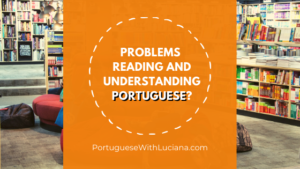* The text you’ll read first appeared in the beginning of my graded reader “Quando o Passado Bate à Porta” when I published it in March/2020. Three years later I reviewed the book and I wanted it to be more like a “real book” – a book for native speakers, because this is how I wanted students to feel. In this text there are tips to help you reading my book, but also for other books you choose.
I’ve used colloquial, informal Portuguese in the book’s dialogues—the expressions and collocations reflect the way we speak!
There are some challenges for you, but also an opportunity to learn new vocabulary.
It’s not easy to understand expressions and collocations in a foreign language because when we are reading we tend to translate to our native language or try to understand each word individually. So my first piece of advice to you is that if there’s a word you don’t understand, maybe it’s part of an expression!
If you don’t understand some words, that’s normal! Maybe you won’t find all the words and expressions you don’t understand in the vocabulary section. Maybe you won’t get the meaning of one paragraph and that’s ok!
 You also have to remember about connotation and denotation.
You also have to remember about connotation and denotation.
Denotation is the literal meaning of a word and connotation is its figurative meaning, an additional meaning the word gets.
See these examples:
- O pássaro voou até a árvore.
- A moto passou voando por nós.
In example number 1, voou takes on the literal meaning of the word. In the second example, the motorcycle wasn’t literally flying, of course, but speeding up. It’s the figurative meaning of voar.
Differentiating between denotation and connotation is also part of understanding what you read.
What can you do when you get stuck with new words or expressions? Here you have some suggestions:
- Read the same paragraph two or three times and try to guess the meaning by context.
- Analyze the word or words you don’t understand: Is it a new verb conjugation? Is it a derivative word? (more on that later).
- Write it down (or save/highlight it) to look it up later.
- Check if it’s in the vocabulary list at the beginning of the chapter, but don’t do it every single time or you’ll get tired of reading and it’s going to be a boring experience. Just do it as a last resort, if you really need to know the meaning of the word to understand the sentence/paragraph.
Verb conjugations and derivative words
I’m going to use two examples from the story. If you are going to read this book in Portuguese, you know the verb decidir. Maybe you don’t know decidissem or decidirem, but if you observe the words, you can guess they are verb forms of decidir. Decidissem and decidirem are no longer completely unknown words; at the very least, you can keep reading with the meaning of the verb in mind. Another example is loucura. Maybe you can recognize the word louco or louca hidden within the word. Maybe you’re not sure whether loucura is a verb or a noun from context. You’ll discover that later!
In the middle and at the end of the book you’ll find some comprehension questions that function as guides to help you understand the story. At the end, you’ll also find some information about the places or facts mentioned in this book.
You’ll also notice that the beginning is harder than the end! You have to be persistent and at some point, you’ll realize the reading is flowing more smoothly. As you keep reading, the vocabulary begins to repeat and you’ll truly get into the story. Everything will begin to make sense and this is why the end flows more easily than the beginning!
Reading a book is different from reading dialogues, paragraphs or short stories from textbooks. With a book, you are exposed to a lot more vocabulary and a natural way of using language.
When you read from a textbook you have specific objectives with the reading, maybe to practice a new verb tense or some expressions. When you read a story in a book, everything you learned before is mixed together. And they are both important!
If you read in your native language you probably do it fast. To have the same ability in Portuguese and get to the point of reading Brazilian literature, you have to keep reading. As with any skill in life: practice makes perfect!



